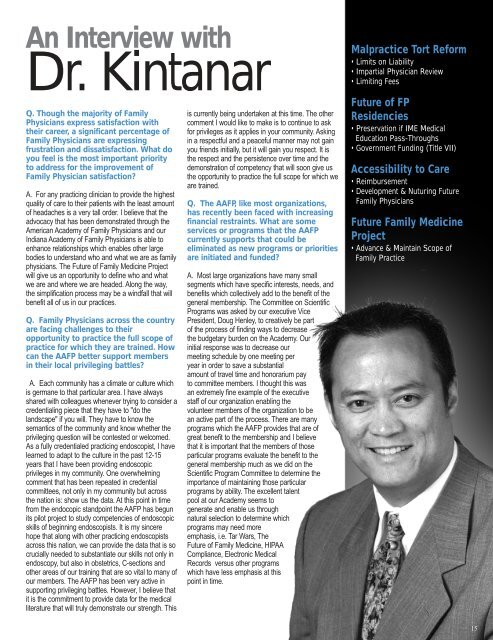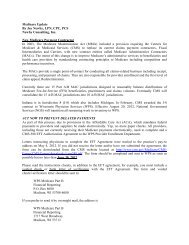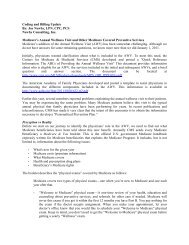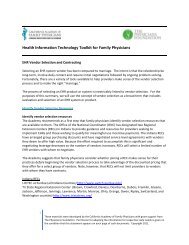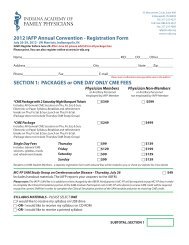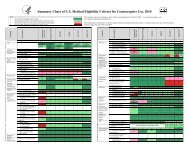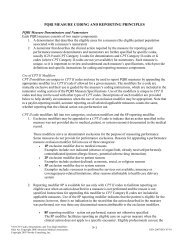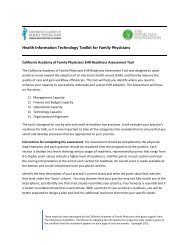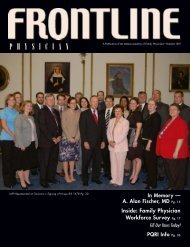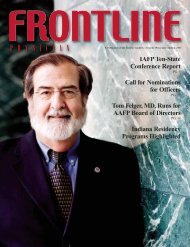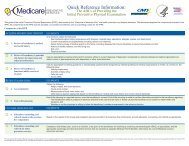Fall - Indiana Academy of Family Physicians
Fall - Indiana Academy of Family Physicians
Fall - Indiana Academy of Family Physicians
You also want an ePaper? Increase the reach of your titles
YUMPU automatically turns print PDFs into web optimized ePapers that Google loves.
An Interview with<br />
Dr. Kintanar<br />
Q. Though the majority <strong>of</strong> <strong>Family</strong><br />
<strong>Physicians</strong> express satisfaction with<br />
their career, a significant percentage <strong>of</strong><br />
<strong>Family</strong> <strong>Physicians</strong> are expressing<br />
frustration and dissatisfaction. What do<br />
you feel is the most important priority<br />
to address for the improvement <strong>of</strong><br />
<strong>Family</strong> Physician satisfaction?<br />
A. For any practicing clinician to provide the highest<br />
quality <strong>of</strong> care to their patients with the least amount<br />
<strong>of</strong> headaches is a very tall order. I believe that the<br />
advocacy that has been demonstrated through the<br />
American <strong>Academy</strong> <strong>of</strong> <strong>Family</strong> <strong>Physicians</strong> and our<br />
<strong>Indiana</strong> <strong>Academy</strong> <strong>of</strong> <strong>Family</strong> <strong>Physicians</strong> is able to<br />
enhance relationships which enables other large<br />
bodies to understand who and what we are as family<br />
physicians. The Future <strong>of</strong> <strong>Family</strong> Medicine Project<br />
will give us an opportunity to define who and what<br />
we are and where we are headed. Along the way,<br />
the simplification process may be a windfall that will<br />
benefit all <strong>of</strong> us in our practices.<br />
Q. <strong>Family</strong> <strong>Physicians</strong> across the country<br />
are facing challenges to their<br />
opportunity to practice the full scope <strong>of</strong><br />
practice for which they are trained. How<br />
can the AAFP better support members<br />
in their local privileging battles?<br />
A. Each community has a climate or culture which<br />
is germane to that particular area. I have always<br />
shared with colleagues whenever trying to consider a<br />
credentialing piece that they have to "do the<br />
landscape" if you will. They have to know the<br />
semantics <strong>of</strong> the community and know whether the<br />
privileging question will be contested or welcomed.<br />
As a fully credentialed practicing endoscopist, I have<br />
learned to adapt to the culture in the past 12-15<br />
years that I have been providing endoscopic<br />
privileges in my community. One overwhelming<br />
comment that has been repeated in credential<br />
committees, not only in my community but across<br />
the nation is: show us the data. At this point in time<br />
from the endocopic standpoint the AAFP has begun<br />
its pilot project to study competencies <strong>of</strong> endoscopic<br />
skills <strong>of</strong> beginning endoscopists. It is my sincere<br />
hope that along with other practicing endoscopists<br />
across this nation, we can provide the data that is so<br />
crucially needed to substantiate our skills not only in<br />
endoscopy, but also in obstetrics, C-sections and<br />
other areas <strong>of</strong> our training that are so vital to many <strong>of</strong><br />
our members. The AAFP has been very active in<br />
supporting privileging battles. However, I believe that<br />
it is the commitment to provide data for the medical<br />
literature that will truly demonstrate our strength. This<br />
is currently being undertaken at this time. The other<br />
comment I would like to make is to continue to ask<br />
for privileges as it applies in your community. Asking<br />
in a respectful and a peaceful manner may not gain<br />
you friends initially, but it will gain you respect. It is<br />
the respect and the persistence over time and the<br />
demonstration <strong>of</strong> competency that will soon give us<br />
the opportunity to practice the full scope for which we<br />
are trained.<br />
Q. The AAFP, like most organizations,<br />
has recently been faced with increasing<br />
financial restraints. What are some<br />
services or programs that the AAFP<br />
currently supports that could be<br />
eliminated as new programs or priorities<br />
are initiated and funded?<br />
A. Most large organizations have many small<br />
segments which have specific interests, needs, and<br />
benefits which collectively add to the benefit <strong>of</strong> the<br />
general membership. The Committee on Scientific<br />
Programs was asked by our executive Vice<br />
President, Doug Henley, to creatively be part<br />
<strong>of</strong> the process <strong>of</strong> finding ways to decrease<br />
the budgetary burden on the <strong>Academy</strong>. Our<br />
initial response was to decrease our<br />
meeting schedule by one meeting per<br />
year in order to save a substantial<br />
amount <strong>of</strong> travel time and honorarium pay<br />
to committee members. I thought this was<br />
an extremely fine example <strong>of</strong> the executive<br />
staff <strong>of</strong> our organization enabling the<br />
volunteer members <strong>of</strong> the organization to be<br />
an active part <strong>of</strong> the process. There are many<br />
programs which the AAFP provides that are <strong>of</strong><br />
great benefit to the membership and I believe<br />
that it is important that the members <strong>of</strong> those<br />
particular programs evaluate the benefit to the<br />
general membership much as we did on the<br />
Scientific Program Committee to determine the<br />
importance <strong>of</strong> maintaining those particular<br />
programs by ability. The excellent talent<br />
pool at our <strong>Academy</strong> seems to<br />
generate and enable us through<br />
natural selection to determine which<br />
programs may need more<br />
emphasis, i.e. Tar Wars, The<br />
Future <strong>of</strong> <strong>Family</strong> Medicine, HIPAA<br />
Compliance, Electronic Medical<br />
Records versus other programs<br />
which have less emphasis at this<br />
point in time.<br />
Malpractice Tort Reform<br />
• Limits on Liability<br />
• Impartial Physician Review<br />
• Limiting Fees<br />
Future <strong>of</strong> FP<br />
Residencies<br />
• Preservation if IME Medical<br />
Education Pass-Throughs<br />
• Government Funding (Title VII)<br />
Accessibility to Care<br />
• Reimbursement<br />
• Development & Nuturing Future<br />
<strong>Family</strong> <strong>Physicians</strong><br />
Future <strong>Family</strong> Medicine<br />
Project<br />
• Advance & Maintain Scope <strong>of</strong><br />
<strong>Family</strong> Practice<br />
15


